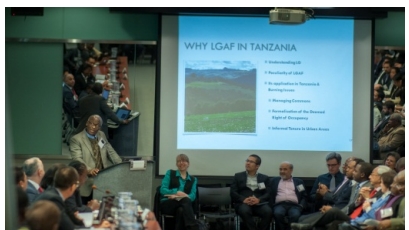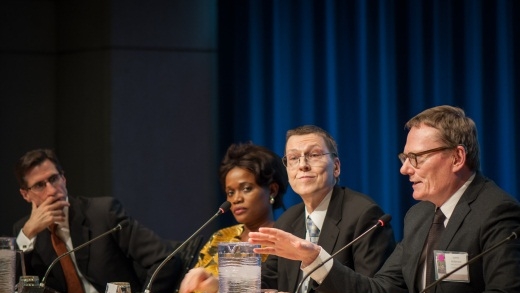What do pastoralist women, agri-businesses, software companies, investment bankers, directors of land departments, activists, project managers, and university professors have in common? They all have a stake in how land rights are assigned and regulated and how this scarce resource is used. Over 1,000 of them gathered from more than 120 countries to take part in the 16th annual World Bank Conference on Land and Poverty from March 23 to 27.
Organized by the World Bank’s Research Department in collaboration with the Global Practices, Regions, and a large number of external partners, this year’s event focused on the theme of ‘linking land tenure to land use’. Over the course of more than 100 sessions participants discussed findings from new research and examined ways to integrate these findings into policies and country strategies. A day-long innovation fair enabled participants to learn about spatial data acquisition, mobile technology, and ways to improve service delivery, transparency, and analytical capacity.
James Robinson, Harvard professor and author of Why Nations Fail, reminded participants during the opening keynote that a narrow technocratic approach that fails to fully account for political economy issues may be ineffective or even have negative consequences. But in a session moderated by Voice of America talk-show host Shaka Ssali, high-level policy makers from South Africa, Kenya, and Rwanda argued that broad-based policy debate and a stepwise approach to implementation can deliver significant change.
The experience of Rwanda in designing, implementing, and adapting its land policy attracted much interest. Determined to address historic discrimination and tenure insecurity, Rwanda put in place a land policy to ensure gender equality, guided by careful pilot efforts informed by rigorous research that helped avoid undesirable consequences.
This gradual approach of continuous learning during implementation allowed Rwanda to regularize all of the country’s 10.4 million plots in a participatory way within two years, compared to decades elsewhere. It increased investment, especially by female-headed households. And it also put the country into the top tier of the Doing Business rankings and generated strong interest by other countries that have been struggling with similar issues. Similarly, Korea, Lithuania, and the UK gave examples of how reforms helped them to improve service delivery, increase transparency, and reduce conflict.

The conference was also a center for sharing good practice and innovations for land governance across multiple domains:
- New Technologies: These are helping to document rights to family and community lands held by traditionally disenfranchised people such as forest communities, slum dwellers, and pastoralists by enabling participatory mapping and local negotiation over rights, including with investors.
- Clear Documentation and Improved Land Management: These can improve tenure security, reduce disputes, assist planning, and help assess the tax gap. Also, where appropriate, disposal of public land through transparent means such as auctions can allow proceeds to benefit all rather than a few well-connected individuals.
- Participatory Processes: These can be incorporated into the assessment of a country’s land governance compared to global best practice. These assessments then feed into country strategies, allow monitoring using administrative data, and provide a basis for field experiments and new ways of combining spatial, administrative, and household data to put in place policies to reduce sprawl and increase density.
- Supply Chain Monitoring: Enhanced abilities to monitor throughout the supply chain allow agribusinesses, traders, processors, and consumer goods firms to make better sourcing decisions, disclose information to document compliance with global goals such as pledges for ‘zero deforestation’, and manage risk in a way that facilitates global capital flows into regions and sectors traditionally considered too risky.
- Administrative Data: Better use of administrative data by governments can assist in monitoring the extent and impact of large-scale land acquisition. Making this information available through national reporting systems can also help investors make better-informed decisions. This requires combining records and administrative data to better assess potential benefits from land taxes, push towards tenure regularization, and capture land value increases that can be used for investment in public infrastructure and services.
- Data Revolution: The data revolution can be harnessed to create approaches to land governance monitoring that combine surveys, administrative data, and global tools such as the Doing Business indicators to allow low-cost, high-frequency monitoring of gender-disaggregated data that stakeholders can draw on to track progress.
These innovations share several elements: they put a strong focus on data to measure progress, they place a premium on open standards and interoperability to make information available to interested parties and feed into country strategies that build on evidence-based discourse, and they use real-time impact evaluations to revise and refine policy reforms.

